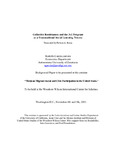
Please use this identifier to cite or link to this item:
http://ricaxcan.uaz.edu.mx/jspui/handle/20.500.11845/149| Title: | Collective Remittances and the 3x1 Program as a Transnational Social Learning Process |
| Authors: | García Zamora, Rodolfo |
| Issue Date: | 4-Nov-2005 |
| Publisher: | Latin American and Latino Studies Department of the University of California, Santa Cruz and the Mexico Institute and Division of United States Studies of the Woodrow Wilson Center |
| Abstract: | Las remesas familiares han tenido un crecimiento explosivo en México en los últimos quince años produciendo importantes impactos posititos en la economía nacional y en el bienestar de los hogares receptores de las mismas. Por su parte, las remesas colectivas y el Programa 3x1 han propiciado la elevación en las condiciones de vida del conjunto de la población en las comunidades de origen donde han promovido cientos de obras de infraestructura básica. No obstante la acentuada limitación presupuestal de ese Programa, que a nivel federal no rebasa los 15 millones de dólares para 23 estados en el 2005, sus aportes más relevantes consisten en promover la organización comunitaria transnacional, en establecer un nuevo espacio de negociación de esas comunidades con los tres niveles de gobierno que se convierte en un proceso de aprendizaje transnacional respecto a la colaboración para proyectos conjuntos y promover una incipiente cultura de control social y rendimiento de cuentas que comienza a expandirse a diversas comunidades y municipios. El desarrollo futuro de este Programa se enfrenta a los desafíos de un aumento sustancial del presupuesto, la mayor organización y capacitación de las comunidades de origen y destino, la transformación de los Comités de Obra en verdaderos instrumentos de control social con todo el respaldo comunitario de las comunidades y los clubes, el cambio institucional en los tres niveles de gobierno y la maduración cívica del conjunto de la población mexicana. |
| Description: | In Mexico, during the past fifteen years, family remittances have grown explosively, and they have had a significant positive effect on the nation’s economy and on household well-being for those families that receive remittances. For their part, collective remittances and the 3x1 Program have improved the living conditions for the general population in the communities of origin, where hundreds of basic infrastructure projects have been implemented. Despite the marked limitations of the program’s budget—at the federal level only US$15 million for 23 states in 2005—its most significant contributions have been the promotion of transnational community organizations and the establishment of negotiating room for those communities vis-à-vis the three levels of government. This has become an arena in which a transnational learning process is unfolding related to collaboration on joint projects and the promotion of an incipient culture of public oversight and accountability, which is beginning to spread to various communities and municipios. This program faces challenges for its future development, including substantially increasing its budget; strengthening organization and training for the communities of origin and destination; and transforming the Comités de Obra (Project Committees) into true instruments of public oversight, with full community support from the hometowns and the clubs. The 2006 political transition at the three levels of Mexican government and the civic maturation of the Mexican people will also be factors in the future evolution of the program. |
| URI: | http://hdl.handle.net/20.500.11845/149 https://doi.org/10.48779/96gm-we79 |
| Other Identifiers: | info:eu-repo/semantics/publishedVersion |
| Appears in Collections: | *Documentos Académicos*-- UA Estudios del Desarrollo |
Files in This Item:
| File | Description | Size | Format | |
|---|---|---|---|---|
| Garcia-Zamora - 2005 - Collective Remittances and the 3x1 Program as a Transnational Social Learning Process.pdf | Artículo Final | 185,37 kB | Adobe PDF |  View/Open |
This item is licensed under a Creative Commons License
